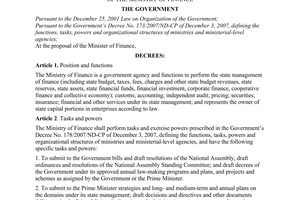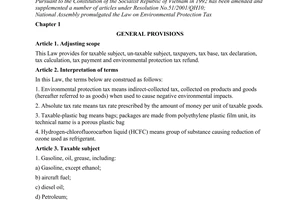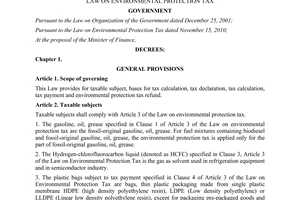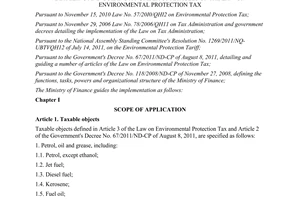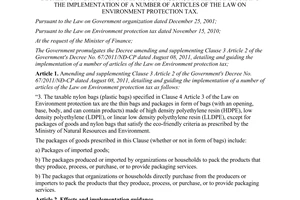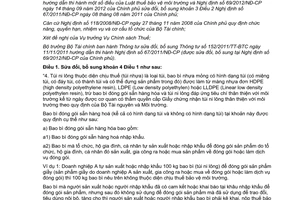Nội dung toàn văn Circular No. 159/2012/TT-BTC amending and supplementing the Circular No. 152/201
|
THE MINISTRY
OF FINANCE |
SOCIALIST REPUBLIC OF VIETNAM |
|
No. 159/2012/TT-BTC |
Hanoi, September 28, 2012 |
CIRCULAR
AMENDING AND SUPPLEMENTING THE CIRCULAR NO. 152/2011/TT-BTC DATED NOVEMBER 11TH 2011 GUIDING THE IMPLEMENTATION OF THE GOVERNMENT'S DECREE NO. 67/2011/NĐ-CP DATED AUGUST 08TH 2011, DETAILING AND GUIDING THE IMPLEMENTATION OF A NUMBER OF ARTICLES OF THE LAW ON ENVIRONMENT PROTECTION TAX
Pursuant to the Law on Environment protection tax No. 57/2010/QH12 dated November 15th 2010;
Pursuant to the Law on Tax administration No. 78/2006/QH11 dated November 29th 2006, and the Government's Decrees guiding the implementation of the Law on Tax administration;
Pursuant to the Government's Decree No. 67/2011/NĐ-CP dated August 08th 2011, detailing and guiding the implementation of a number of articles of the Law on Environment protection tax, and the Government's Decree No. 69/2012/NĐ-CP dated August 08th;
Pursuant to the Government's Decree No. 118/2008/NĐ-CP dated November 27th 2008, defining the functions, tasks, powers and organizational structure of the Ministry of Finance;
At the proposal of the Director of the Tax Policy Department;
The Minister of Finance promulgate a Circular to amend and supplement the Circular No. 152/2011/TT-BTC dated November 11th 2011 guiding the implementation of the Government's Decree No. 67/2011/NĐ-CP (amended and supplemented in the Government's Decree No. 69/2012/NĐ-CP).
Article 1. Clause 4 Article 1 is amended and supplemented as follows:
“4. Taxable nylon bags (plastic bags) re thin plastic bags and packages, that open at the top and may store products therein, made of HPDE (high density polyethylene resin), LDPE (low density polyethylene) or LLDPE (linear low density polyethylene resin), except for packages of pre-packed goods that satisfy the eco-friendly standards as from being issue with the Certificate of Eco-friendly nylon bag as prescribed by the Ministry of Natural Resources and Environment.
The packages of pre-packed goods (whether or not in the form of a bag) provided in this Clause are specified as follows:
a) The packages of pre-packed goods include:
a1) The packages of pre-packed imported goods.
a2) Packages produced or imported by organizations, households, or individuals to pack the products that they produce, process, or buy, or to provide packaging services.
Example 1: enterprise A produces or imports 100 kg of packages (nylon bags) to pack shoes (produced, processed, or purchased by enterprise A) or to provide packaging services, the this 100 kg of packages are exempted from environment protection tax.
The packages that the producer or importer has committed or declared to use for packaging during the import stage, but are not used for packaging but used for internal use, exchange, or for donation, then the producer or importer must declare and pay environment protection tax, and shall be disciplined as prescribed by law provisions on tax administration.
Example 2: enterprise A produces or imports 100 kg of packages (nylon bags), and enterprise A has committed or declared, at the import stage, that the packages are used for packing shoes at (produced, processed, or purchased to provide packaging services). If enterprise A uses 20 kg of them to pack the shoes, and 30 kg for exchanging, 40 kg for internal use, and 10 kg for donation, enterprise A must declare and pay environment protection tax on the 80 kg of packages used for internal use, exchange, and donation, and shall be disciplined as prescribed by law provisions on tax administration.
a3) Packages directly purchased by organizations, households, or individuals from the producer or the importer to pack the products that they produce, process, or buy, or provide packaging services.
Example 3: enterprise B purchases 200 kg of packages from enterprise A (a package producer or importer) to pack shirts (produced, processed, purchased, or packed by enterprise B), such 200 kg of packages are exempted from environment protection tax.
The packages that the users do not use to pack products (the user has committed that the packages are purchased for packing products), but use for internal use, exchange, donation, or selling to another organization, household, or individual, the buyer must declare and pay environment protection tax to the tax authority in charge, and shall be disciplined as prescribed by law provisions on tax administration.
Example 2: enterprise B purchases 200 kg of packages from enterprise A (a package producer or importer) for packing shoes (enterprise B has committed that the packages are purchased for packing products). The shoes are produced, processed, purchased, or packed by enterprise B. If enterprise B uses 50 kg of them to pack the shoes, and 20 kg for exchanging, 30 kg for internal use, 40 kg for donation, and 60 kg for selling to enterprise C, then enterprise B must declare and pay environment protection tax on the 80 kg of packages used for internal use, exchange, and donation, and sale, and shall be disciplined as prescribed by law provisions on tax administration.
a4) The packages of pre-packed prescribed in Point a2 and a3 this Point do not include shopping bags when selling.
Example 5: Supermarket A or store B purchases 100 kg of nylon bags from enterprise C (a producer or importer), including 50 kg of nylon bags for storing goods that supermarket A or store B sells to their customers, and 50 kg of nylon bags for packing products (the products are produced, processed, or purchased for packing by supermarket A or store B), then the 50 kg of nylon bags for storing goods in this case are not packages of pre-packed goods.
b) The produced or imported packages identified as packages of pre-packed prescribed in Point a2 and a3 must have the following papers:
b1) For packages produced by organizations, households, or individuals (hereinafter referred to as package producer):
- If the packages are used for packing the products produced or processed by the package producer, the package producer must have the original of the written commitment, stamped and signed by their legal representative (if the package producer is a legal entity), that the packages are produced for packing their products, and send it to the tax authority in charge when producing the packages (the commitment must specify the quantity of packages, the anticipated quantity of production or processing, the quantity of the products that need packaging, and the quantity of packages used for packing products).
- If the packages are purchased by the package producer for packing products or providing packaging services, apart from the written commitment, stamped and signed by their legal representative (if the package producer is a legal entity), that the packages are produced for packing their products, and send it to the tax authority in charge when producing the packages (the commitment must specify the quantity of packages, the anticipated quantity of production or processing, the quantity of the products that need packaging, and the quantity of packages used for packing products), the package producer must also have: the photocopy of the Sale contract (when purchasing products for packaging), or the photocopy of the Packaging contract (when providing packaging services) directly signed by the package producer and the seller or the provider of the sp being packed.
- If the produced packages are directly sold to another organization, household, or individual (hereinafter referred to as the package buyer) for packing products, the package producer must have:
+ The photocopy of the Sale contract directly signed by the package producer and the package buyer.
+ The original of the written commitment, stamped and signed by the legal representative of the package buyer (if the package buyer is a legal entity), sent to the package producer by the package buyer (the commitment must specify the anticipated quantity if products being produced or processed when the packages are purchased for packing the products that they produce or process; the anticipated quantity of products being purchased for packing when the packages are purchased for packing the products purchased; the anticipated quantities of products being packed when the package buyer provides packaging services; the quantity of products that need packaging, and the quantity of packages needed to pack such products).
+ The list of the package sale invoice made under the form No. 03/TBVMT promulgated together with this Circular. Completely fill in the VAT invoice (or the sale invoice, applicable to the facilities paying tax using the direct method) when making a package sale invoice), and the line “Sold in accordance with the contract No. ……….. dated ………… exempted from environment protection tax.
b2) For imported, the importer must provide the Customs dossier of imported packages to the customs as prescribed. The importer must make declaration and bear responsibility for the declaration of packages imported for packing products or selling to package buyers.
When selling imported packages (for packing products as declared) to the package buyer for packing products, the package importer must have:
+ The photocopy of the Sale contract directly signed by the package importer and the package buyer.
+ The original of the written commitment, stamped and signed by the legal representative of the package buyer (if the package buyer is a legal entity), sent to the package importer by the package buyer (the commitment must specify the anticipated quantity if products being produced or processed when the packages are purchased for packing the products that they produce or process; the anticipated quantity of products being purchased for packing when the packages are purchased for packing the products purchased; the anticipated quantities of products being packed when the package buyer provides packaging services; the quantity of products that need packaging, and the quantity of packages needed to pack such products).
+ The list of the package sale invoice made under the form No. 03/TBVMT promulgated together with this Circular. Completely fill in the VAT invoice (or the sale invoice, applicable to the facilities paying tax using the direct method) when making a package sale invoice), and the line “Sold in accordance with the contract No. ……….. dated ………… exempted from environment protection tax.
If the imported packages have been granted customs clearance as prescribed by law, the package importer must not remake the declaration to be exempted from environment protection tax.”
Article 2. Point 2.4 Clause 2 Article 2 is amended and supplemented as follows:
“2.4. The goods directly exported to abroad by the producer (including exported goods made of imported materials) or exported by an authorized trader, the customs shall not collect environment protection tax on the exported goods and imported materials.
If the goods subject to environment protection tax is purchased by a organization, household, or individual for exporting, the producer must make declaration and pay environment protection tax when selling goods.
Example 6: If enterprise A imports 40 kg of nylon bags to printing labels or more processing to make finished prescribed different from the initial ones, the exports them, then enterprise A may not make declaration and pay environment protection tax on that 40 kg of nylon bags when importing.
Example 7: If enterprise B imports 100 kg of termiticide, which is subject to restricted use, to are materials for processing goods for export, then enterprise B may not make declaration and pay environment protection tax on that 100 kg of termiticide, which is subject to restriction use, when importing.”
Article 3. Adding Point 1.4 to Clause 1 Article 5 as follows:
“1.4. For multi-layer nylon bags produced or process from HDPE, LDPE, LLDPE membrane, and other kinds of plastic membrane (PP, PA,…) or other substances such as aluminum or paper etc., the environment protection tax are calculated by the proportion of HDPE, LDPE, LLDPE in the multi-layer nylon bags. Depending on the amount of HDPE, LDPE, LLDPE used in the production of multi-layer nylon bags, the producer or importer of multi-layer nylon bags must make declaration and bear responsibility for their declaration.
Example 8: enterprise A produces or imports 100 kg of multi-layer nylon bags, the proportion of HDPE, LDPE, LLDPE in multi-layer nylon bags 70%, and the proportion of other plastic membrane (PA, PP, etc.) is 30%.Therefore, the environment protection tax on 100 kg of multi-layer nylon bags that enterprise A must pay is 100 kg x 70% x 40,000 VND/kg = 2,800,000 VND.”
Article 4. Adding the following to the end of Point 2.2 to Clause 2 Article 7:
“- For the petrol, oil, and grease imported for other purposes than for sale; the lubricating oil and grease packed separately that are imported together with accessories or parts of airplanes, or with machinery and equipment, the tax payer must make and declaration pay environment protection tax to the customs.
- For the petrol and oil that are exported or sold according to the invoices, the tax payer must make declaration and may environment protection tax according to such invoices.”
Article 5. Adding Point 2.4 to Clause 2 Article 7 as follows:
“2.4. Goods subject to environment protection tax produced at home or in non-tariff zones, and traded between the domestic market and a non-tariff zone, within a non-tariff zones, or among the non-tariff zones, or exported and imported on the spot (within the Vietnam’s territory), the producer must make declaration and pay environment protection tax, except for packages produced for packing products as prescribed in Point a2 and a3 Point a Article 1 of this Circular.
The exported and imported goods shall be identified as whether or not subject to environment protection tax when they are exported and imported across the Vietnam’s border.”
Article 6. Effect
1. This Circular takes effect on November 15th 2012.
2. Organizations and individuals are recommended to send feedbacks on the difficulties arising during the course of implementation to the Ministry of Finance for consideration and settlement./.
|
|
FOR THE
MINISTER |
------------------------------------------------------------------------------------------------------
This translation is made by LawSoft,
for reference only. LawSoft
is protected by copyright under clause 2, article 14 of the Law on Intellectual Property. LawSoft
always welcome your comments

